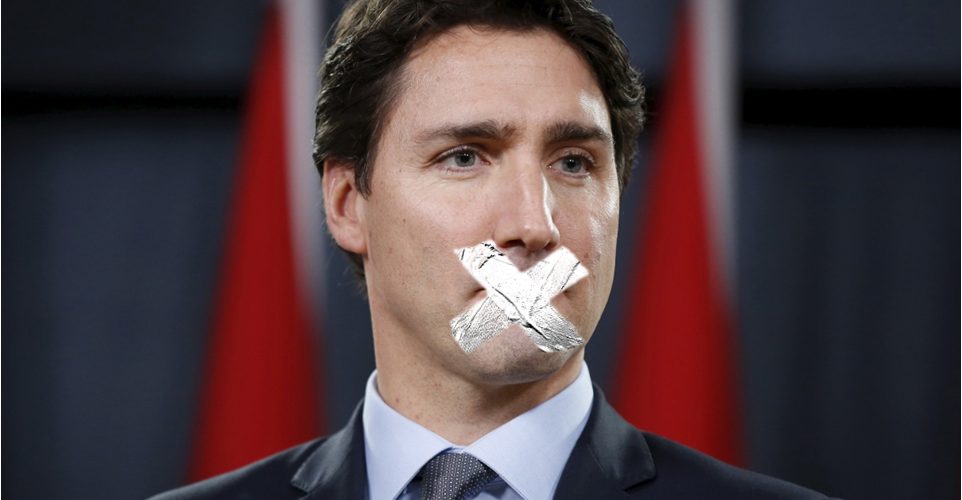Prime Minister Trudeau spoke at a town hall meeting in Peterborough while touring southern Ontario in January. He said: “We can’t shut down the oilsands tomorrow. We need to phase them out. We need to manage the transition off of our dependence on fossil fuels.” Following an uproar, he back-pedaled on the issue.
Prime Minister Trudeau spoke at a town hall meeting in Peterborough while touring southern Ontario in January. He said: “We can’t shut down the oilsands tomorrow. We need to phase them out. We need to manage the transition off of our dependence on fossil fuels.” Following an uproar, he back-pedaled on the issue.
Apparently, Canadian PMs cannot suggest the oil industry needs to be phased out. Such phrases stick in too many powerful, gilded craws. This is because potential investors are less likely to invest in infrastructure such as pipelines, extraction or refineries for anything destined to be “phased out.”
This is a sad reality, but things could be worse. In today’s America, similar to Harper’s Canada, government employees cannot even mention climate change. Trudeau is arguably too cautious in the face of economic power, but at least he accepts scientific reality. More, Environment Minister Catherine McKenna is clearly open to a balanced view. She wants to offset pipeline approvals and also announced Canada’s carbon tax last month.
Nevertheless, when our national conversation about energy is so constrained by politics, is real policy compromise between environmentalists and government even possible? A key component of a middle ground is recognition of the need for an energy transition; recognition that fossil energy’s days are numbered.
Trudeau wants to balance oil industry interests and environmental needs. Of course, he must see thatTrump’s term in the White House creates a climate policy emergency. “
“Alternative energy” once seemed like a dream of only the most radical environmentalists. Now, cities and countries set dates when allt heir electricity will come from renewables. Some, including Norway and India, have also established when all new cars will be electric. Inevitably, virtually all energy will arrive as electricity, and once electricity is completely sourced from renewables, alternative energy will no longer be “alternative,” but simply energy. The truth is, fossil fuels are legacy energy: soon, oil will only be “what we used to use.”
A real compromise cannot avoid climate reality or the reality that Canada could, with a few exceptions, stop burning fossil fuels by mid-century. It follows, given their extraction costs and environmental impacts that tar sands production might cease a bit sooner. Gordon Laxer, founding director of the Parkland Institute at the University of Alberta, recently proposed 2040.
Even major energy players realize that the tar sands will never be completely utilized. This is partly because bitumen production has disproportionate carbon emissions (which will be taxed) and is relatively expensive. France’s Total, Royal Dutch Shell, Conoco Phillips, Marathon Oil and Norway’s Statoil have recently opted to leave the tar sands behind.
For our part, environmentalistscould accept that “phase down” is more realistic than “phase out.” For example, the use of petrochemicals could continue indefinitely because they are not burned. We are also a long way from post-carbon airplanes. Environmentalists already acknowledge that it will take several decades to produce enough renewable energy to achieve a comprehensive“phase down.”
However, there is still no avoiding eventual financial losses in Canada’s oil patch.Though discussing phasing out fossil fuel production in Canada is politically challenging, acknowledging it nonetheless might widen Canada’s range of energy and economic policy alternatives. Political leaders sometimes need to say uncomfortable things.
This is essential to protect Canada’s economic future. Electrified vehicles may dominate faster than we think. Electric cars are a superior technology and potentially far less costly to operate. Technology improvements in batteries and charging speedcould accelerate a shift that would reduce oil prices and undermine demand for expensive tar sands oil. Canada needs to acknowledge this possibility to cope with it effectively.
While the transition from a fossil-fuel-powered society to an electric one cannot be instantaneous, if it begins soon it can be non-disruptive. The transition will be somewhat gradual becausepeople are still buyinggas-powered vehicles that will last. No one will (or should) scrap vehicles before they need replacement. Doing so is nonsensical both economically and environmentally. There will also be some long-term demand for oil if only because petrochemicals use nearly ten percent of what is produced. Petrochemicals often have environmental problems, but the climate effects are small.
Trudeau wants to balance oil industry interests and environmental needs. Of course, he must see thatTrump’s term in the White House creates a climate policy emergency. Trudeau’s statement in response to the withdrawal from the Paris Accord was nuanced, expressing disappointment that the United States federal government had withdrawn, not that the United States as a nation had withdrawn.
Acting as a climate leader could have significant economic benefits for those who move ahead decisively.”
Yet, new Canadian pipelines assume that tar sands output will continue for a considerable time, implying a “business as usual” attitude towards Washington. Trudeau also accepts the oil industry position that it cannot presently afford to reduce methane emissions. It is time to rethink these things, especially because climate and economic realities, Trump notwithstanding, still imply that the industry is unlikely be more prosperous going forward. Both oil demand and prices are still likely to fall.
As Washington undoes federal support for renewables, Canada has a chance to seize the moment. We can attract displaced scientific talent and potential renewable energy innovators forced to look elsewhere. Both could be lured to places that acknowledge the reality of legacy energy and encourage those who are building the future. France’s new leader has already invited them to move there.
Moreover, Canada and other nations must step up carbon actions while Washington denies reality. Other nations, including ours,need to take the lead Obama provided prior to Paris. Since Trump’s withdrawal there are real signs that this may be happening. Particularly heartening in the possibility that European nations and China may come to Canada to discuss the steps ahead. Acting as a climate leader could have significant economic benefits for those who move ahead decisively. It is past time to start thinking in the long-term, rather than dancing around the hard conversations and betting on yesterday’s energy.

Robert Paehlke is a professor emeritus at Trent University where he taught environmental policy and politics for 35 years. About 40 years ago, he envisioned a magazine that was both scientifically sound and journalistically interesting, and Alternatives was born. “Bob P,” as we call him, sits on the magazine’s editorial board and he contributes articles and blog posts as often as we can trick him into it.
He is the author of Environmentalism and the Future of Progressive Politics (1989), Democracy’s Dilemma: Environment, Social Equity and the Global Economy (2004), Some Like It Cold: The Politics of Climate Change in Canada (2008) and Hegemony and Global Citizenship (2014).













